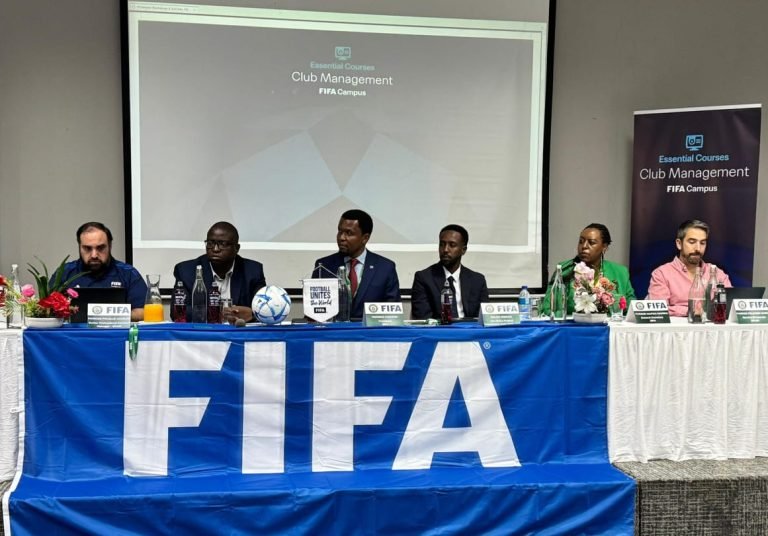The much-anticipated FIFA Essential Course in Club Management (African Edition) officially kicked off this morning at Cresta Sango, Harare, signalling a new and exciting chapter in the professionalisation of Zimbabwean football.
The two-day workshop, hosted by the Zimbabwe Football Association (ZIFA) in partnership with FIFA, has brought together some of the most influential figures in the game – both locally and internationally – to share insights, strategies, and frameworks aimed at strengthening football governance, management, and commercial growth.
The opening ceremony was attended by an impressive array of dignitaries, including Mr. Gelson Fernandes, FIFA Deputy Chief of Member Associations and Director for Africa, ZIFA President Nqobile Magwizi, and a team of FIFA experts led by Solomon Mudege, FIFA Head of Development Programmes, and David Fani, Lead of the FIFA Regional Office for Southern Africa.
Also in attendance were Marcos Picalló Aguilar, Senior Professional Football Manager from FIFA’s Zurich office, Marcos Pelegrin Garcia, FIFA Consultant and speaker from Spain, Salah Osman, MA Africa Project Coordinator from FIFA’s Paris office, and Sanda Rasoamahenina, MA Development Manager from the Johannesburg Regional Office.
Representing the domestic football landscape were key administrators and club executives, among them Premier Soccer League (PSL) Chairperson Isaiah Mupfurutsa and Zimbabwe Women’s Premier Soccer League (ZWPSL) Chairperson Chido Chizondo.
Their presence underscored the commitment by local football leadership to embrace global best practices and usher in a culture of professionalism at all levels of the game.
In his opening remarks, ZIFA President Nqobile Magwizi described the workshop as a watershed moment for Zimbabwean football, one that aligns with his administration’s vision to rebuild and modernise football structures across the nation.
“This workshop marks the beginning of a new era,” said Magwizi. “As an Association, we have made the professionalisation of our game a central priority. Through partnerships such as this with FIFA, we are equipping our football administrators and club executives with the knowledge, skills, and tools they need to operate in a modern football ecosystem.
“The goal is not only to strengthen our top leagues but to ensure that every level of our football – from grassroots to elite – benefits from structured, sustainable development.”
Magwizi further emphasised that ZIFA’s reform agenda is centred on capacity building, good governance, and financial transparency. “Professionalism must not be an abstract term; it must be lived, demonstrated, and embedded in our football DNA,” he added.
“This workshop is the first of many steps we are taking to ensure Zimbabwean football reclaims its rightful place on the continental and global stage.”
Delivering the keynote address, FIFA’s Gelson Fernandes commended ZIFA for its commitment to capacity development and expressed FIFA’s continued support towards the holistic growth of football in Zimbabwe.
“FIFA is proud to see Zimbabwe taking bold steps towards professionalising its football structures,” said Fernandes. “The essence of this programme is empowerment. Zimbabwe has tremendous potential, and with the right structures, its clubs and administrators can become models for the region.”
He added that FIFA’s development approach is rooted in partnership and shared vision. “We do not impose, we collaborate,” Fernandes noted. “The knowledge shared here – on strategic planning, governance, finance, club licensing, and marketing – is not theoretical. It is practical and tested. It is about giving football administrators the ability to make better decisions and to build institutions that last.”
The FIFA Essential Course in Club Management forms part of FIFA’s global initiative to enhance the professionalism of club administration across all continents. The Harare edition is one of several being implemented in Africa, with a curriculum designed to help participants understand and apply critical elements such as strategic planning, governance, financial management, club licensing, and commercial and marketing strategies.
FIFA experts Marcos Pelegrin, Solomon Mudege, and Marcos Picalló Aguilar will lead the various modules over the two days, ensuring a blend of global insight and local relevance. Discussions will include real-world examples and case studies from successful clubs around the world, while also contextualising lessons for the African football environment.
Beyond the technical sessions, the workshop serves as a networking platform for club leaders, league administrators, and regional stakeholders.
For Zimbabwe, the event represents more than a training programme – it is a signal of intent. It embodies ZIFA’s desire to transform football administration from an informal, passion-driven pursuit into a disciplined, professional, and commercially viable enterprise.
ZIFA President Magwizi concluded his remarks with a call for collective responsibility:
“Our journey towards professionalisation will not be achieved by ZIFA alone. It requires the collective effort of our leagues, clubs, coaches, and administrators. Let us work together to build structures that outlive us, so that the next generation inherits a football industry that is strong, transparent, and sustainable.”
The workshop’s inclusive nature also reflects ZIFA’s broader vision to extend such capacity-building initiatives to grassroots and community football structures. The Association envisions a system where administrators at every level – from youth academies to regional leagues – can access training and support to strengthen their governance and operational frameworks.
“We want to see every level of our game benefit from structured learning,” Magwizi said. “This is how we will create a sustainable pipeline of competent administrators, coaches, and leaders who will move Zimbabwean football forward.”
As the sessions got underway, the energy in the room reflected optimism and unity of purpose. Participants from across the football spectrum shared ideas, experiences, and aspirations for the future of the local game.
The presence of FIFA’s global experts provided both inspiration and a sense of accountability – that Zimbabwe’s football transformation is not a distant dream but a project already in motion.
The successful start of the FIFA Essential Course in Club Management in Harare stands as a powerful testament to what collaboration, vision, and commitment can achieve. It marks the beginning of what many believe will be the genesis of a truly professional era for Zimbabwean football – one built on knowledge, integrity, and innovation. -ZIFA website

